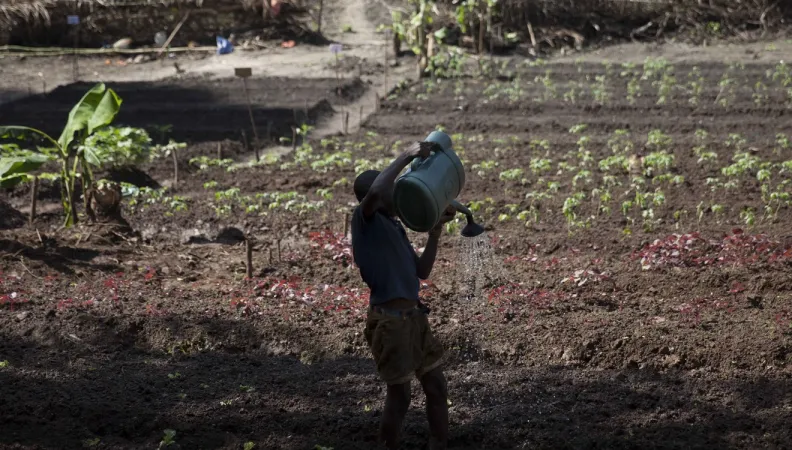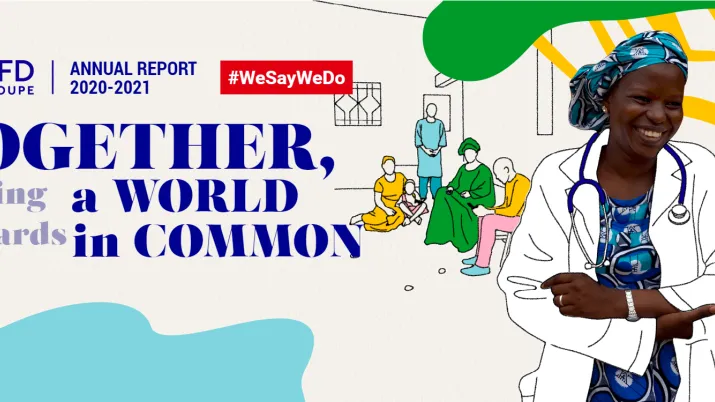Share the page
In Regions Afflicted by Conflict and Crisis, Making Development Sustainable
Published on

In regions caught up in conflict and crises, conducting development work can be difficult, and ensuring the benefits last can be even harder. That’s why projects require careful monitoring and a multi-track approach that addresses not only development objectives like access to water or education, but the prevailing security environment and complex human relations. We look at how such operations should be managed for maximum sustainability.
|
Evaluations Report 2023
Our work in photos and figures
Find out more
|
In 2022, AFD conducted a cross-analysis of 62 evaluations of projects carried out in the Sahel in a variety of sectors, from rural development and water to energy, education, and health. Although the projects are delivering noteworthy results, evaluations show their sustainability is anything but guaranteed.
See also: Evaluations Report 2023
During crises or times of conflict and instability, it can be hard to find intermediaries, whether among local authorities or civil society to ensure the infrastructure or services provided continue to exist long after the project has come to an end.
Numerous states lack the capacity to assure the continuation of development projects alone, which is why AFD often relies on a variety of partners and international NGOs to carry them out. But some INGOs are often more accustomed to responding to humanitarian emergencies and short-term situations than adopting a long-term, structuring approach.
Hence the importance of partnering with organizations that are familiar with the countries and regions they’re working in.
In Cameroon, the I Yéké Oko project, rolled out between 2019 and 2023 by the Red Cross, was designed to respond to the Central African migration crisis of 2014. It is one of the most violent events in the Central African Republic’s history, culminating in a mass exodus of the country's Muslim minority and leading to the collapse of its social and economic structures.
See also: AFD Group in Cameroon: the Fruits of a Long-Standing Alliance
Florian Charpentier, International Red Cross coordinator of the I Yéké Oko project, looks back at the results of this initiative.
What tangible results has the I Yéké Oko project achieved to date, with funding from AFD in Cameroon and the Central African Republic?
Florian Charpentier: I Yéké Oko means “We're in this together” in the Sango language, and this was the response to the Central African migration crisis of 2014. Over 300,000 Central African refugees flocked to Cameroon, putting pressure on the region's natural, governmental, and economic resources. This cross-border project aims to alleviate this pressure by promoting civic, social, and economic cohesion.
Thanks to increased cooperation with institutional partners, civil society organizations, local authorities and final beneficiaries, most of the objectives set have been achieved. Awareness-raising campaigns on civil status and the creation of local dialogue forums have strengthened local governance. At the same time, activities to promote peace and manage agro-pastoral resources and areas have limited local conflicts linked to the influx of refugees.
Now that the social climate has calmed down, we have also helped to strengthen economic cohesion by encouraging the creation of village savings and credit associations, supporting young people with projects in livestock farming, market gardening, and small businesses, and creating infrastructure, such as covered markets, slaughterhouses, drying areas and poultry farms. This holistic approach has strengthened people's resilience in tackling the region's challenges.
See also: Nengo: Helping in the Healing of Sexual Violence Victims in the Central African Republic
How can we ensure the sustainability of these results?
A number of conditions must be met to achieve long-lasting results: a sound analysis of needs, a comprehensive integrated approach, the government's backing and the involvement of institutional and local partners. We know, for example, that some of the initiatives launched by I Yéké Oko in Cameroon will continue, as they are now directly incorporated into the budgets of cities and town councils.
However, political stability and security remain a major challenge, especially in the Central African Republic. The aim of humanitarians and development workers is to do everything in our power to ensure that the benefits of our projects last, but we must remain humble about our ability to have an impact on an area, a region or even an entire country. After all, its fate is in its own hands. It must not depend on the international community.
Further reading
AFD Group's Annual Report: Responding to Emergencies while Remaining Focused on our Long-Term Development Miss...
AFD Group's Annual Report is now online in English. The dynamic, interactive format brings to life the activities, investments and projects financed by Agence Française de Développement in 2020. The R...
Published on July 6, 2021

